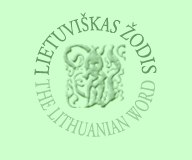Jonas JUŠKA (Juškevičius) 1815-1886.
Educator and linguist, born in Žarėnai, county of Telšiai, on May
27, 1815. In 1844 he graduated from the University of Kharkov, where
he studied classical languages and later taught them at several
gymnasiums (high schools) in Russia. From 1858-63 he served as an
inspector of the Russian Cadet Corps. His request to be given a
teaching position in Lithuania was denied by the governor-general of
Vilnius because his brother, Rev. Antanas Juska, stood accused of
having had connections with the insurrection of 1863. While employed
in the school system Juška applied himself to the study of problems
of teaching, producing a number of essays that earned the praise of
officials in the ministry of education. The remainder of his time was
devoted to research in the Lithuanian language.
Jonas Juška evinced interest in the
scientific study of Lithuanian since 1852, having made the
acquaintance of the Russian academician. L Sreznevsky and later that
of the Polish linguist J. Baudouin de Courtenay, professor at the
University of Kazan' from 1875-83. In that same city Juška taught
school from 1875-86. On an assignment from the Russian Academy of
Sciem he undertook a critical review of A Schleicher's Litauische
Grammati (1856) and in this way deepened hi knowledge of the
Lithuanian language. Soon he became an authority on Lithuanian and its
dialects. One of his important works is a study of Lithuania) dialects
and orthography, Kalbos letuviszko lėžuv'o ir letuviszkas
statraszy mas arisa ortografija (1861), wherein he divides the
former into four groups: 1) Samogitian, 2) Prussian Lithuanian, 3)
dialect of the Ariogala area, and 4) Eastern Lithuanian. This
classification was essentially based on phonetic criteria, i.e.,
pronunciation of ie, no, an, en, d', t', I (unpalatalized),
i-diphthongs (ai, ei), and half-'open e in those dialect
groups. Despite its shortcomings Juška's classification represented
an advance over that of Schleicher. Since at that time no single
dialect was accepted as the base of Standard Lithuanian, Juška
advised his readers to write each in his own dialect, while
nevertheless adhering to a uniform Lithuanian orthography.
However, his proposals for a common
Lithuanian alphabet, diverging considerably from those currently in
vogue (Schleicher, Kurschat), did not meet with much success. To be
sure, his suggestion that cz, sz w be replaced by č, š, v,
respectively, eventually came to be adopted (v had already been
used by Schleicher), as was his recommendation to substitute the
unpalatalized ; for the Polish I. But the same was not true of
his proposal to introduce a special letter for the lowmid vowel e and
to write e in place of diphthong ie, nor of his suggestion that
palatalization of consonants be indicated by means of the acute (')
as, for example, in lėžuv'o instead of liežuvio. When
the Latin alphabet was forbidden and forcibly supplanted by the
Russian in 1864 (see Press Ban), Juška composed a unique alphabet
consisting of Russian and Latin characters on the grounds that Russian
letters alone would be incapable of representing all of the basic
sounds occurring in Lithuanian. This mixed alphabet was used in an
edition of 33 Lithuanian folksongs, Litovskie narodnye pesni
(1867) which failed to satisfy either the Russians or the Lithuanians.
Juska also wrote a grammar of the Lithuanian language in Russian, Uchebnaia
grammatika litovskogo iazyka (1862), but this work remained
unpublished. In order to facilitate his obtaining a teaching
assignment in Lithuania, he began to rewrite all of its Lithuanian
words in Russian characters, but when his request was refused, he did
not finish preparing the manuscript for publication. In addition,
Juška was working on a Lithuanian-Russian dictionary Ruchnoi
litovsko-ruskii slovar', which he brought up to the word
marnastis.
Juška came into additional contact with
problems of Lithuanian linguistics when he collaborated with his
brother in publishing a collection of Lithuanian folksongs and a
dictionary of the Lithuanian language (see Antanas Juška). After his
brother's death in 1880, the Russian Academy of Science entrusted
Juška with preparation of the final draft for publication after
taking account of comments by the Russian linguist A. Potebnia.iHe put
much effort into the execution of this task. Juška translated the
dictionary into Russian up to the letter L, corrected his
brother's translation, provided some of the entries with accentuation
marks, and made a number of changes and additions to the Lithuanian
phrases and orthography. It is believed that on account of certain
inconsistencies for which he was held responsible Juška was relieved
from the editorship on April 27, 1886. Nervous over this development,
he died two days later in Kazan', having previously sustained a heart
attack in 1885.
Bibl.: J. Baudouin de Courtenay,
"Jan Juszkiewicz. Prace Filologiczne, I, Warszawa, 1885;
E. Wolter, "Johann Juschkewitsch," Mitteilungen der'
Litauischen Literarischen Gesellschaft, Vol. 12, Heidelberg, 1887;
J. Tumas, Lietuvių literatūra rusų raidėmis ir broliai
Juškos-Juškevičiai, Kaunas, 1924; P. Jonikas, "Jonas
Juška," Tautos Mokykla, No. 12-13, 1936 (Kaunas); -,
"Iš lletuvių kalbos rašybos istorijos," Archivum.
Philologicum, Vol. 8, Kaunas, 1939; V. Drotvinas,
"Kalbininkas Jonas Juška," Tarybinis Mokytojas, June
9, 1955 (Vilnius); V. Biržiška, Aleksandrynas, Chicago, 1965.
Text from the ENCYCLOPEDIA LITUANICA
I-VI. Boston, 1970-1978

